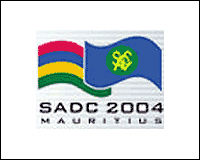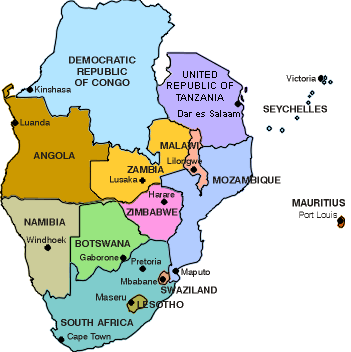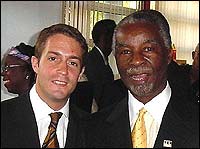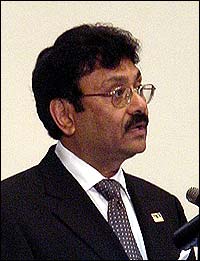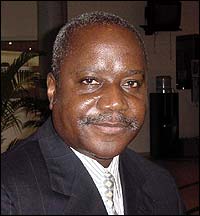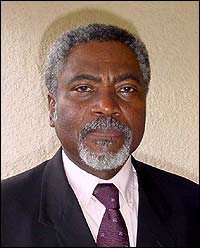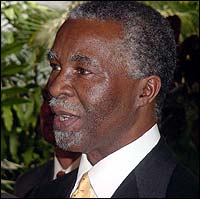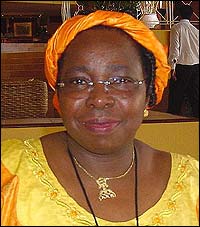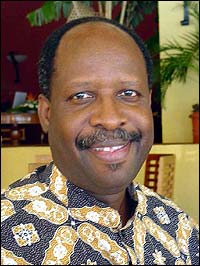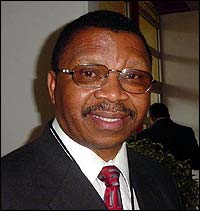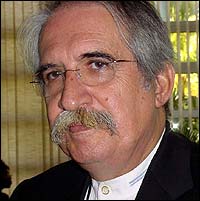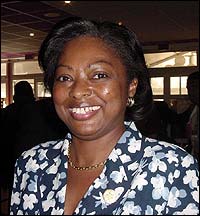
|
|
|
|
||
Mauritius, August 7th – 17th 2004 - Challenges like poverty, AIDS, competitiveness and democracy-building no longer have any borders. Today, nation-states are realizing that these problems can only be solved through regional and international cooperation. Like ASEAN, CARICOM, MERCOSUR or the countless other regional blocks that have popped up in the past two decades, SADC (the Southern African Development Community) is taking the shape of an southern African European Union. Much like the EU, SADC grew out of a practical need for intra-regional cooperation. Today it is growing into a strong umbrella organisation that could assemble a common Free Trade Area by 2008. Members include Angola, Botswana, the Democratic Republic of Congo, Lesotho, Madagascar, Malawi, Mauritius, Mozambique, Namibia, Seychelles, South Africa, Swaziland, United Republic of Tanzania, Zambia and Zimbabwe.
This month, the heads of state of these 15 member states met on the beautiful island of Mauritius for the annual 2004 Summit in order to plan future economic and political cooperation programs. World Investment News was there to cover the event and get the reactions from high level government officials. A new chapter Economic growth in the southern African region has been positive this year, growing at an average rate of 3.2%. While countries like Mozambique, Malawi and Tanzania registered high GDP growth rates of 7%, 5.9% and 5.5% respectively, most other southern African nations stood at an average of 4% growth last year. It was noted that Angola continues to face serious post-war reconstruction challenges. “The country needs urgent support in the areas of de-mining, social resettlement of displaced persons and refugees and the rehabilitation of socio-economic infrastructure” said Dr. Prega Ramsamy, Executive Secretary of SADC. The Minister of Industry of Angola, Joaquim Duarte da Costa David, agreed that the road ahead will not be easy, saying that regional integration “will require a great deal of effort from Angola in terms of the development of industrial potential and trade activity.” “Therefore,” adds David, “privatisation is one of the tools which we are exercising in order to boost production and growth rates, and contribute to SADC’s integration in the global economy”. Regional security was also an issue and the situation in the DRC [Democratic Republic of Congo] was being closely monitored, as tensions continue to threaten the peace process that has been negotiated by President Kabila. This year’s summit saw the adoption of SIPO, the Strategic Indicative Plan for the Organ, which plans to provide guidelines for the implementation of common political, defence and security cooperation in the region. The first test of the effectiveness of SADC’s security provisions will therefore be in Congo DRC. “We plan to ask for the activation of certain security mechanisms, which is part of the SADC statute” said the Minister of Foreign Affairs of the Democratic Republic of Congo, Raymond Ramazani Baya. Minister Ramazani nevertheless stressed that peace would soon return to the DRC. “Even though there are still some problems to deal with, Congo is moving towards peace, which is essential for the greater economic development of the nation”. Regional peace is even more important now that Congo DRC is implementing a major regional cooperation project called the Western Corridor Power Project (known as Westcor) which plans to “harness the large water resources of the Congo River at Inga, to produce and supply electric power” for the SADC region, said Dr. Ramsamy, Executive Secretary of SADC. The project will comprise the construction of 4000MW hydroelectric dam, a transmission line and a telecommunications line. Democracy-building This year will see numerous elections in the region. South Africa and Malawi have already held successfully peaceful elections, while future elections include: Botswana – October 16th, 2004 Namibia – November 15th, 2004 Mozambique – December 1st, 2004 Zimbabwe – March 2005 Mauritius – Early 2005 Tanzania – Early 2005
The rhetoric of the conference was geared towards a strong cultural development of democratic values. “Real democracy has to grow from within—it is an evolution, not a revolution” said the President of Tanzania, Benjamin William Mkapa, objecting to the campaigns by western powers to implement a “coca-cola democracy” that did not respect national specificities. He stressed that not every country is the same, and therefore we should not impose the same system of democracy in every country, he said. Dr. Nkosazana Dlamini Zuma, Minister of Foreign Affairs of South Africa, agreed. “Democracy is not a ‘one-size-fits all’ system” she proclaimed. “It must have the same standards as in the west, yet nobody should be able to impose the same system in every country”. This common position illustrated a desire by SADC members to solve the issue of democracy on their own terms, through education, freedom of expression and freedom of association. It was an inspiring issue that united the participants and brought forward genuine aspirations of social development and intra-regional support. Meanwhile, the presence of Robert Mugabe, the President of Zimbabwe, sent an indication that there is still much work to be done in order to build a real sense of democracy in certain SADC member countries. Social challenges AIDS and poverty are the main factors that were being addressed at the Summit, using a combination of health, developmental and economic programs. “To achieve internationally set goals of eradicating poverty, we have to achieve a GDP growth of at least 7% per year and halve the proportion of the population that lives on less than US$1 per day between now and 2015. We also need an investment rate of 25-30 per cent of GDP to reach this target” says Dr. Ramsamy, Executive Secretary of SADC. Leonardo Santos Simao, Minister of Foreign Affairs of Mozambique is optimistic on this issue, adding that Mozambique is successfully winning the fight against poverty. “We managed a 15% of decrease of poverty alleviation between 1997 and 2003, and in some provinces there was even a decrease of up to 18%. So it is possible to reach our goals of poverty alleviation”. “It can be done” adds Simao, with a satisfied smile. Economic goals Competitiveness was an important issue, especially as the SADC group of nations plans to inaugurate a Free Trade Area by 2008. A Strategic Business Plan was adopted in order to support small and medium-sized businesses and encourage the competitiveness of regional products. SADC has also developed into a strong regional negotiating authority, leading the way towards bilateral EU-SADC and US-SADC trade negotiations. In fact, SADC is negotiating a protocol agreement with the European Community which should be signed by December 2007 and enter into force on the 1st of January, 2008. As a united region, many SADC countries are now focused on regional projects, which will grant their country a greater economy of scale. “Along with the attraction of foreign direct investment, intra-regional trade is very important” underlined Adsalom Dlamini, Minister of Economic Planning of Swaziland, who added that Swaziland is a small country that needs to cooperate regionally in order to succeed in the global marketplace. Similarly, the small Kingdom of Lesotho is seeking to piggy-back on the huge South African economy, especially since the market will be unified by 2008. It hopes to bring in tourists going on packages to South Africa, while offering South African companies the opportunity to outsource certain manufacturing services at a lower cost. So perhaps regional trade will be a success – and in fact the DRC is already benefiting from regional cooperation thanks to regional funding programs. “Our participation in SADC opens the door to the financing of major regional projects which will have an impact on many countries” said the Minister of Foreign Affairs of the Democratic Republic of Congo, Raymond Ramazani Baya. “We therefore believe that our regional development strategy will greatly help the economic development of Congo”. Meanwhile, regional programs like AGOA (the African Growth and Opportunity Act – a program which offers preferential, zero-tariff trade to the United States) has helped certain countries to diversify their industry, such as Lesotho, who has become “the largest exporter to the US textile market of the AGOA member countries” proudly states Timothy T. Thahane, Minister of Finance of Lesotho. Nevertheless, the Minister of Industry of Mozambique, Carlos Morgado, warns that the process of trade development is still a slow and difficult path. “Our major constraints are in the supply side, since there is a huge infrastructure deficit in our region which AGOA itself cannot solve”. “AGOA is a good program but there needs to be a great deal of investment to make it work” adds Morgado. Future steps Following the return to democracy and economic growth, Madagascar was accepted as a new member of SADC. Madagascar's President Marc Ravalomanana attended the summit and said that he was honoured to join the prestigious club. Speculation fuelled that perhaps Rwanda’s membership would be an issue that might be considered next year. After a marathon week of meetings, the SADC Summit finished on August 17th with a positive note. “We are all trying to help each other and discuss social, political and economic issues as a community. From this we are finding new solutions to the issues that affect us all” said Adsalom Dlamini, Minister of Economic Planning of Swaziland. “All in all, the Summit was conducted in very positive atmosphere” concluded Dlamini. |
|
||
|
|
|
Make World Investment News Your Homepage. |









